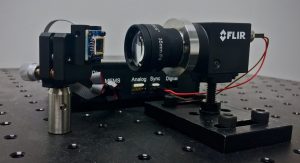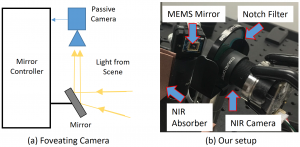 Assistant Professor Sanjeev Koppal has received a prestigious NSF CAREER Award for his project, “Fast Foveation: Bringing Active Vision into the Camera.” The five-year award will support Dr. Koppal’s research in the area of foveation, the process through which the eye fixates on the object of interest in a visual field. Koppal’s research applies foveation to computer vision—cameras combined with artificial intelligence which attempt to automate the tasks done by human visual systems. The fast-foveating cameras will be able to automatically scan a visual scene, determine the item of interest, and focus on that item, much more quickly and efficiently than current systems.
Assistant Professor Sanjeev Koppal has received a prestigious NSF CAREER Award for his project, “Fast Foveation: Bringing Active Vision into the Camera.” The five-year award will support Dr. Koppal’s research in the area of foveation, the process through which the eye fixates on the object of interest in a visual field. Koppal’s research applies foveation to computer vision—cameras combined with artificial intelligence which attempt to automate the tasks done by human visual systems. The fast-foveating cameras will be able to automatically scan a visual scene, determine the item of interest, and focus on that item, much more quickly and efficiently than current systems.
The fast-foveating camera system combines off-the-shelf components combined with some cutting-edge technology. The research uses a camera outfitted with newly available, next generation micro-mechanical optics that can quickly and adaptively change the camera resolution. The camera is combined with an AI-controlled MEMS mirror which directs the camera’s ‘attention.’ The adaptive resolution switching, combined with the mirror allows the system to ‘see’ in a way that is analogous to the way in which a human looks at a scene and is able to focuses on critical information.

There is an educational component to the project as well. Research outcomes will be integrated in Dr. Koppal’s courses, especially fundamental procedures such as foveated camera calibration. In addition, a program called LensLearning will be integral to the project. LensLearning will introduce the foveating camera concept outside the lab and will impact high-school students through special hands-on UF programs. The program will also enable the training of one high-school student and one undergraduate senior every summer, with the goal of providing opportunities to underrepresented minorities in foveated camera research.

